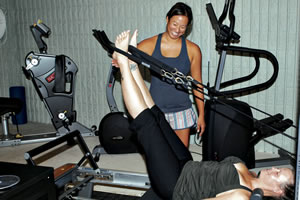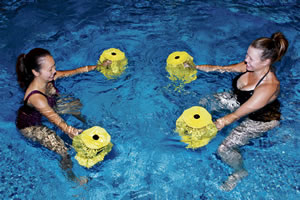Keeping Women Healthy
Interviewed by Rasa Fournier
Wednesday - November 09, 2011
E-mail this story | Print this page | Comments (0) | Archive
 Del.icio.us Share
Del.icio.us Share

Aisha Holcomb & Jaime Kuamo’o
Physical therapists at OrthoSport Hawaii
Where did you receive your schooling/training?
Aisha: I went to school at the University of the Philippines Manila. I have 17 years of experience. I ran a women’s health program for eight years at Southern Chester County Medical Center in Pennsylvania.
Jaime: I went to Samuel Merritt in Oakland, Calif. I’ve been practicing about seven years. I am also an orthopedic certified specialist and became interested in women’s health after having my baby girl.
What are some of the primary women’s health issues you work with?
Jaime: Pelvic instability, incontinence, preand postpartum health. Common prenatal and postpartum symptoms consist of lower back pain, sciatica, carpal tunnel syndrome, swelling of the arms and legs, hip and groin pain and loss of balance. The unique thing about our clinic is the ability to use aquatic therapy in our treatment program, which allows for partially loaded exercises for a pregnant woman, whose body is constantly going through changes.
Are preand postpartum women your primary clients?
Aisha: We see problems not only manifesting for patients while they’re pregnant or after they’re pregnant, but really during the course of their lives, because certain things like incontinence, pelvic and lower back pain, lymphedema, coccygodynia and vaginismus occur at any point in our lives. We deal with these issues as part of the Women’s Health program.

|
We also offer classes and private sessions for patients who don’t have any problems but want to do a preventative program, including pregnant women.
What, in laymen’s terms, are vaginismus, coccygodynia and lymphedema?
Aisha: Vaginismus is vaginal tightness causing discomfort, burning, pain, penetration problems, or complete inability to have intercourse. The vaginal tightness results from involuntary tightening of the pelvic floor, although the woman may not be aware that this is the cause of her penetration or pain difficulties. We also deal with other causes of pelvic floor spasms, not just vaginismus, but spasms that are sometimes the result of lower back pain and nerve damage.
Coccygodynia is lower back pain in and around coccyx, which is the base of the spine, usually radiating to the perineal area.
Then we have lymphedema, which is swelling of the extremities. It can be idiopathic (unknown cause) or occur with breast cancer, post mastectomy and radiation.
Can you say something more about incontinence?
Jaime: Any woman can have incontinence. It’s not just preor postpartum but also elderly women and men. Incontinence is not talked about much because it’s an embarrassing thing, but it can be helped. That’s why we really want to get the word out about our women’s health program.
Aisha: Women who undergo a hysterectomy also tend to have incontinence problems because the uterus has been taken out, so the internal organs, especially the bladder will descend and cause incontinence.

|
Any additional information about your facility and how you help with these various problems?
Jaime: I’m Pilates trained, so I utilize preand postpartum Pilates exercises. We have a Pilates reformer. It allows assistance when patients can’t tolerate your typical land-based exercise. It gives assistance just like exercising in water would - it allows them to do a lot more exercise, while decreasing their pain at the same time.
Aisha: For incontinence we do Kegel exercises, pelvic floor retraining, biofeedback, electrical stimulation and behavior modification.
How does biofeedback help with incontinence?
Aisha: It’s a device that’s attached to the patient. A lot of people who are incontinent or who have very poor pelvic floor contraction cannot feel the contractions. They don’t really know if they’re doing the correct exercises, so the biofeedback is a machine that will give them auditory and visual feedback and let them know if they’re doing the correct exercises.
You mentioned earlier treating diastesis recti. What is that?
Jaime: It’s very common. It’s basically over-stretching and tearing of the line (linea alba) that comes in between the abdominals. During the course of pregnancy as the abdomen stretches, the linea alba can tear. We teach women how to exercise safely so they don’t tear further causing it to herniate. Doing exercises too aggressively after birth can create a larger tear. We teach postpartum women how to safely get back into exercising again.
Aisha: One of the biggest problems with women after they give birth is there’s a lot of joint laxity until six months after you stop breast feeding. Aggressive exercise really isn’t indicated until you’ve stopped breastfeeding. So we teach women how to exercise gently and do core strengthening and abdominal exercises without causing problems like diastesis recti.
Anything else you’d like to mention about your practice?
Jaime: If women are having these problems during pregnancy or even incontinence and it’s medically necessary to get help, it’s covered under insurance. As long as your doctor or your OB-GYN is willing to send you to physical therapy, it can be covered under insurance.
Aisha: Our sessions are individualized so we spend the entire hour one-on-one. We do both manual therapy-hands-on treatment that could include soft tissue mobilization, massage or lymphedema management -
and individualized, specialized exercises just for the patient.
E-mail this story | Print this page | Comments (0) | Archive
Most Recent Comment(s):













